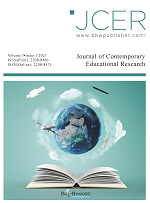Abstract
In the process of learning any languages, pronunciation is an important part of language acquisition because pronunciation may influence a listener’s comprehension of one’s expression. An example is the classical mistake of pronouncing “sink” and “think.” Because Germans cannot pronounce /s/, the rescue worker cannot understand why a man who is “thinking” needs help. In China, English learners are also facing the problems of pronunciation. Gimson, a famous professor of linguistics in Britain, pointed out that when learning a language, one should understand 50%-90% of its grammar and 1% of its vocabulary, but it is necessary to fully master the pronunciation, thus highlighting the importance of pronunciation.[1] However, pronunciation is a difficult part of a second language acquisition. This article analyzes the problems of pronunciation and discuss some methods on how to resolve them.
References
Gimson, A(1980). An introduction to the pronunciation of English (3rd ed.). Edward Arnold. Retrieved from https://abdn.primo.exlibrisgroup.com/discovery/fulldisplay?context=L&vid=44ABE_INST:44ABE_VU1&search_scope=MyInst_and_CI&isFrbr=true&tab=Everything&docid=alma990000965000205941
Saville-Troike, M(2006). Introducing second language acquisition. Cambridge University Press. Retrieved from https://abdn.primo.exlibrisgroup.com/permalink/44ABE_INST/1jd70l9/alma990011069100205941
Ringbom, H(1990). Language transfer. Cross-linguistic influence in language learning: Odlin, Terence, Cambridge: Cambridge University Press, 8(3):392–393. Elsevier Ltd. Retrieved from https://doi.org/10.1016/0346-251X(90)90015-W
Lado, R(1963). Linguistics across cultures : applied linguistics for language teachers. Retrieved from https://abdn.primo.exlibrisgroup.com/permalink/44ABE_INST/1jd70l9/alma990002937650205941
Hongwei, J(2010). The negative transfer of Chongqing Dialect in English phonetics learning. Exam Journal, (29):101-102. Retrieved from https://kns.cnki.net/kcms/detail/detail.aspx?FileName=KDZK201029083&DbName=CJFN2010
Shixia, H(2014). A Study on the Negative Transfer of Gansu Dialect in English Phonetics Learning. Journal of Longdong University, (06):45-47. Retrieved from https://kns.cnki.net/kcms/detail/detail.aspx?FileName=LDXS201406011&DbName=CJFQ2014
Yongna, M(2018).The Negative Transfer effect of Northeast Dialect in English Phonetics Learning. Short Story (Original version), (11):120-121. Retrieved from https://kns.cnki.net/kcms/detail/detail.aspx?FileName=DPXS201811056&DbName=CJFN2018
Lenneberg, E., Chomsky, N., & Marx, O(1967). Biological foundations of language. Wiley. Retrieved from https://abdn.primo.exlibrisgroup.com/permalink/44ABE_INST/1jd70l9/alma990003102900205941
Bialystok, E., & Hakuta, K(1994). In other words: the science and psychology of second-language acquisition. Basic Books. Retrieved from https://abdn.primo.exlibrisgroup.com/discovery/fulldisplay?context=L&vid=44ABE_INST:44ABE_VU1&search_scope=MyInst_and_CI&tab=Everything&docid=alma990010777270205941
Chuanpeng, T(2019). A Study on the Influence of English Fun Dubbing App on English Pronunciation level of College Students (Master's degree thesis, Central China Normal University). Retrieved from https://kns.cnki.net/KCMS/detail/detail.aspx?dbname=CMFD202001&filename=1019249452.nh
